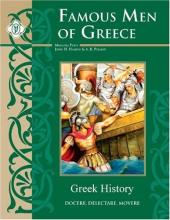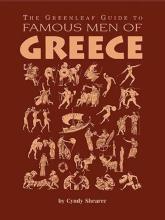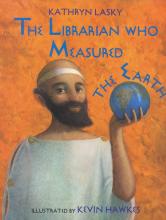Biographies Ancient Greece
Famous Men of Greece
Like Famous Men of Rome, Famous Men of Greece introduces ancient history in the manner of Plutarch, by means of thirty-one short (4-5 page) biographies of the great men of Ancient Greece. It begins back at the point where history merges with legend, and ends with the fall of Greece to Rome in 146 B.C.
The introduction gives a brief description of the pantheon of mythical gods and goddesses of Greece. The book explains that this is how the Greek citizen of ancient times would have started with the historical record – that though we call these stories "myths" now, they tell us something about how the people thought in those days. From there, the first nine chapters cover figures of legend – where possible truth is mixed with make-believe. These stories are also important to Greek history, because they show what the Greeks valued in their heroes and the stories they learned and told to each other. Starting with Chapter X on Lycurgus the Spartan who lived in the 9th century B.C., we reach the actual historical record. The book advises the student to learn to discern between history, legend and myth in his reading and to ask himself "What things in this story could really have happened?"
My children, who use this book as a history spine in 4th grade, have all loved these tales of Greek heroes and statesmen. In addition to showing the continuum between legend and historical records, these books provide what to me is of first importance: lessons in evaluating people and events through an ethical, Christian perspective. History learned by stories is more easily remembered for children grades 3 to 7 than lists of facts and details to memorize for tests. Also, this is the way the ancients themselves learned and wrote history; showing the importance of their values through the lives of their good and their bad leaders.
Greenleaf Guide to Famous Men of Greece
The Librarian Who Measured the Earth
This is a fascinating story, told for children and fully illustrated (beautiful full color pictures with interesting and at times humorous details) of the Greek Scientists, Mathematician and Astronomer – Eratosthenes. (Don't worry – the author does help you to pronounce the name). Eratosthenes was born in the 3rd century B.C. in the country we now call Libya to Greek parents. There he was educated in the classical Greel tradition and developed a keen interest in the world around him. As a young man he was sent to Athens to study where he became known as a scholar and historian. At 30 he was appointed tutor to the son of the King Ptolemy II of Egypt and so he settled in Alexandria. He became involved in the great Library at Alexandria where he eventually became head librarian. In this setting he worked on his most famous problem – attempting to calculate the circumference of the earth. The book takes us through the process he went through in solving the problem and illustrates the events and concepts involved in a way that can be grasped by young children (early gradeschool and up – although my preschoolers enjoyed the book without fully grasping all the details). The story is particularly interesting because his calculations were within 200 miles of our present day figures.
We enjoyed this book very much – the content is great and the illustrations are very nice. It would make a fine supplement for Greek History and encompasses a bit of Math and Science as well. The reading level is more challenging than your average picture book (perhaps 4th grade level) but it could be read aloud to younger children.



